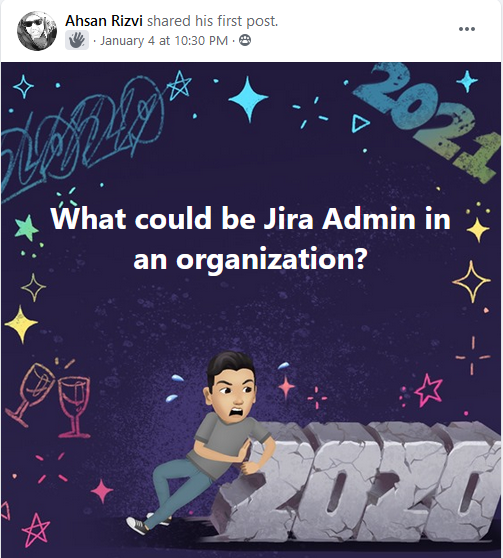So I was browsing through Facebook the other day, honestly procrastinating on this article, when I saw this post come up.

I had to read through it a few times to begin to understand what was being asked. Then I went to the comments where it was confirmed. This person wanted to know how to define a Jira Admin. Fortunately, Aaron Geister had already swooped in with a pretty good answer.

However, this got me thinking. I’ve never really stopped to define a Jira Admin on this platform in my own words. So, I figured we do that today. What is a Jira Admin, and what responsibilities can you expect if you look into this as a career.
Wait, are you sure you haven’t defined this somewhere?
I had to check this myself, to be honest. I’ve covered what you should do in your first week as a Jira Admin. I, with the help of my colleagues, defined a consultant. However, the closest I’ve come is speaking about this role as part of a team, which is alright if you are on a team. However, most of my experience (and I dare say most of yours) is as a Lone Jira Admin with no team to back you up. This is the kind of role I’d like to speak to today.
Get used to wearing Multiple Hats.
As Aaron correctly pointed out, the responsibilities of your average JA is pretty varied. Both the exciting and terrible thing about working on this platform is that it’s improbable that you will be doing the same thing every day. So the key to being a good JA is to be flexible enough to adapt to each of the responsibilities in real-time. That means you may have to put off A to work on B because priorities changed on you. It may mean you have to be willing to try something you’ve never done before. So, let’s get into some of the things you can expect to be doing as a Jira Admin.
Business Analyst

When I got my first Jira instance to manage, I had just started as a Junior Linux Administrator. I had this grand vision that I’d be able to stay in the server room and work on systems all day. Well – I can’t say if this is true for other systems – but it’s a flat out lie if you are managing Jira. To be effective as a Jira Admin, you have to be out there, meeting the people using your system.
That is because it will be part of your responsibility to review how teams are working and adapt Jira to match. You’ll need to understand what they are doing, how they go about it, and how Jira can help them.
Trainer

This role was one of the most surprising for me when I first started running Jira. But people will look to you to not only be the expert but also to teach them what you know. Therefore, you will likely be finding yourself giving presentations and training sessions often. Jira is popular, but it’s amazing how many users don’t know how to use it to its full potential.
And in case you think this is a “Once and done” sort of deal, nope. You will likely need to repeat this training for new employees, so I find it best to prepare a slide deck, practice it, and maintain it as Atlassian changes or adds features.
Tester

I’ve run a few Jira instances and have even been fortunate enough to have a few champions to help me among the userbase. Still, finding people to do testing when it comes to upgrades or changes will be a challenge. Look, even your champions will have their actual job to do and may be too busy to help.
Therefore, you will need to understand how to do testing, when you should do it, and be prepared to execute those tests yourself. Because you had better believe that your users will find whatever problems you missed after a system change.
Even if you are fortunate enough to have volunteers who will do testing for you in your organization, you will still need to understand what will need to be tested to share that with them. People’s time is a valuable resource, and it won’t do to waste it running tests that ultimately doesn’t check anything useful.
Arbitrator

I like this term for the role you will play here. The idea is, sometimes you will have conflicts between teams on a Jira system. Jira has several global settings, and it occasionally does happen that one team will propose a change that will break the required settings for other teams. It will be up to you to determine when a change will result in such a conflict, decide what the actual need behind the request was, see if there are any other ways to satisfy the need and if not – negotiate an acceptable solution to all parties.
The critical point I want to place here is a party here that won’t be heard if you don’t give it a voice. The system itself needs to be considered, and the end-users often don’t think about its needs. It will be up to you to balance the users’ needs (i.e., “Usefulness”) with the needs of the system (i.e., “Performance). Often, on systems that are seen as “Slow,” the leading root cause is just this – people leaned too far into usefulness without considering the impact on system performance. It is a balancing act, but it will be up to you to arbitrate this.
Project Leader

Yes, you read that correctly. On top of everything else you will be doing, you will also be working various projects—all unofficially, of course. Stuff needs to happen in Jira – whether it’s a new training course, an upgrade, or a new screen layout for your teams. It will be on you to make sure that these projects finish on time. This means you will need to figure out what resources you have, whom you need to do what, and when it needs to be done. In other words: You are the Project Lead.
Maintainer

This role was what I thought I’d be doing most when I first became a Jira Admin. While it is a significant portion of the job, it’s not nearly as large a segment as you’d initially think. This part of the job can include anything from the following list:
- Add Custom Fields
- Change Custom Field configurations
- Adding a new workflow
- Building a workflow from scratch
- Setting up Projects
- Adding or updating users
- Adding or updating groups
- Adjusting User Directories to handle the previous two for you
- Setting up Application Links
- Setting up other Integrations
- Resolving issues with Integrations
- Maintaining the Database
- Maintaining the underlying OS
- Optimizing the platform
- Upgrading Jira
As you can see – plenty to do here.
So why would anyone do this?
So, you’re looking now at a role that asks you to be a Business Analyst, Arbitrator, Trainer, Project Lead, and an Admin – all at the same time. Why would anyone volunteer for all that?
Well, I can’t answer for everyone, but I can answer for myself. It’s always been rewarding. Your job – if you do it well – is to make everyone else’s lives easier. And again, if you do it well, people will take notice. You likely won’t be front and center, but people will recognize what you do and show you some appreciation for it.
That’s not to say it won’t be frustrating, tiring work. But any job worth doing will be so.
Let me close out with a story from when I was at University. I played in the school’s Athletic Band – and even had a leadership position as an upperclassman. One day, my senior year, I notice one of the new freshmen sitting off to the side, looking depressed. I go over and ask what’s wrong, and he goes on to explain that his dream since he was a kid was to one day work at NASA. However, now that he was in college and looking at the course work, he didn’t know if he had it to complete the degree, let alone get to NASA.
I took a second, absorbed what he was saying, then gave him this advice.
“If a dream was easy, it wouldn’t be worthwhile.”
The Jira Guy, circa 2010
I’m delighted to report this freshman did graduate with a degree in Mechanical & Aerospace Engineering and is now working at mission control for the International Space Station. He’ll even still quote this saying from time to time.
I was speaking about his dream then, but the same is true for this role. If this role were easy, it wouldn’t be worthwhile. Helping teams get the most out of not only Jira but themselves is very rewarding, and at this point, I’d have a hard time imagining myself doing anything else.
So, what do you think?
Is there anything you would add or anything you do that I didn’t cover here? Let me know about it in the comments! Be sure to follow, share, and comment on social media! You can find me on LinkedIn, Facebook, Twitter, and Instagram. You can also support the Blog directly at Patreon. In exchange, you will get direct access to me as well as patron-only posts.
But until next time, my name is Rodney, asking, “Have you updated your Jira issues today?”
